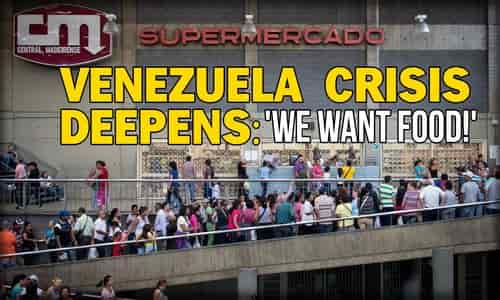What America Must Learn From Venezuela's Economic Collapse
 By PNW Staff August 15, 2016
Share this article:
By PNW Staff August 15, 2016
Share this article:
Venezuela has made the news again this week for yet another low in
the history of what anyone would classify as a failed state. Government
Decree 9855, issued by President Nicolás Maduro under his broad
emergency powers, allows for any Venezuelan to be forcibly relocated to
agricultural labor camps in order to combat widespread food shortages.
These forced labor camps are not in
punishment for any crime, political or otherwise, but instead yet
another failed Communist solution to government mismanagement that will
remove ordinary Venezuelans from their jobs and homes and force them
onto government-controlled slavery on plantation farms, unable to leave
for an extendable period of 60 days.
Now
echoing the worst abuses of Stalin and Mao, the slave labor camps,
starvation, corruption and disorder that characterize Venezuelan society
should serve as a warning to Americans who don't believe in the
consequences of socialist theory in action.
Let's
take a quick survey of how far Venezuela has fallen. Decades before,
Venezuela was one of the richest and most prosperous nations in South
America. Without the drugs of Colombia and with oil wealth and an
educated population that embraced both capitalistic and democratic
principles, Venezuela showed great promise. But it also suffered from
enormous social inequality.
Hugo Chávez rose
to power on the back of a populist movement that promised social welfare
to the poor underclass of Venezuelan society. Once in power, however,
he nationalized the oil industry and used its profits to fund housing,
healthcare and food subsidies for millions.
Over
time, the mismanagement of these social programs, the kleptocratic
nature of government officials and the sharp drop in oil prices pulled
the country further into ruin.
Chávez was
replaced by the clownish and inept Maduro, a former bus driver and union
organizer who had failed to graduate high school, and Venezuela has
rapidly accelerated both its conversion to a communist autocracy and its
death spiral as a nation.
Venezuela now has
the world's highest crime rate and its capital of Caracas competes only
with the City of Tegucigalpa, Honduras for the world's most dangerous
city. The country has by far the highest inflation in the world, with
official numbers found at Statista putting the current rate for 2016 at
481.52%, ahead of South Sudan at 212.44%, Suriname 36.82% and Yemen at
27.54%.
Massive food shortages continue to
plague the country and force Venezuelans to wait hours in line to be
allowed to buy even a few basic goods when they become available in the
mostly-bare store shelves.
Medical supplies
have been depleted for more than two years and the failing energy
infrastructure is responsible for frequent widespread blackouts. A
corrupt government uses its near-complete media control to put down food
riots and imprison opposition leaders.
So how did Venezuela get where it is today and how can we avoid the same fate?
1.
Currency Controls: The socialist government instituted a regimen of
control on foreign currency exchange that requires government permission
and central control for any exchange between Bolívares and a foreign
currency.
Imports and exports were shut down
almost overnight, businesses competed to pay bribes to government
officials and the black market for dollars flourished alongside 6
official exchange rates that were rarely used. The government has been
locked in a legal battle with the website dollartoday.com to prevent
displaying the true exchange rate for the dollar.
Lesson: Centralized currency control doesn't work but free markets do.
2.
Price Controls: The Chavista government sought to combat inflation by
setting a precio justo (fair price) for a growing list of staple
products. Vendors selling above this price would have their goods
confiscated and could be jailed. The problem is that the precio justo
was often significantly lower than the cost of product. Shop owners
threw cartons of eggs into the street rather than lose money on each
sale and the economy continued is death spiral.
Lesson: Centralized currency control doesn't work but free markets do.
3.
Red Tape: Socialism meant government control, of everything. Businesses
need permits to purchase raw materials, permission to manufacture,
specific permissions to ship to the warehouse and then another
permission to bring the product to the retail store.
There
are fees to be paid, forms to be filled out and the cost of business,
for those that can import raw materials, has grown exponentially.
Politically uncooperative business owners find their permissions delayed
or denied, food products spoiled on the trucks or factories seized "for
the people".
Lesson: Get government out of business. Less regulation helps everyone.
4.
Entitlements: The socialist government, known as Chavista, after Hugo
Chávez, gained power by promising free benefits to the poor. This
redistribution of wealth bought the Chavistas enough votes to gain
power, but once in power they were tied to a system of constant handouts
of food, housing and community medical technicians.
Now
the only way to survive is through the government-subsidized food
system. For example, a single chicken or 7 pounds of beans on the open
market costs more than a month's minimum salary.
The
free housing the government distributed to millions? The Chavistas
neglected to mention that their government retains title to those
apartments and, in the last election, the districts that voted for the
opposition saw their residents evicted from their free housing.
With
the collapse in the price of oil, on which Venezuela depends for 96% of
its exports, the system of social entitlements is unsustainable and has
led to lines, food riots and a burgeoning black market economy.
Lesson:
Wealth redistribution systems are destructive. Liberal policies in the
US that buy votes with housing, welfare or free medicine should be seen
for what they really are, attempts to buy the votes of the poor with the
tax dollars of the middle class.
The US falls
deeper into debt every year trying to pay for social programs that,
even in the absence of a crash, promise to hobble the economy in the
future with crushing interest payments.
5.
Imported Voters: Hugo Chávez promoted his social programs and invited
the poor and downtrodden from Colombia to immigrate and take advantage
of free housing, free food and socialized medicine.
As
many as 5.6 million Colombians migrated to Venezuela, either to escape
the Colombian conflict or to enjoy a lower cost of living. The Chavistas
granted this population, 156,000 of whom had official refugee status,
voting rights and further build a party of dependency.
That
is until recently when the economic crisis intensified and Colombian
communities threw their votes behind the opposition. Then Colombia was
blamed, legal immigrants were forcibly deported, families were broken,
houses were demolished and Maduro fanned the flames of xenophobia in
order to shift attention from his own failed policies.
At the height of the crisis, Maduro promised to allow in 20,000 Syrian refugees in a fresh attempt to import foreign voters.
Lesson:
Immigration is healthy when it is controlled, not used to buy voting
blocks. The move to allow uncontrolled immigration from the Middle East
into the US and plans to grant amnesty to illegal aliens echoes similar
plans that have wreaked havoc in Venezuela and Europe.
6.
Corruption: The socialist government of the Chavistas is among the most
corrupt on the planet. Government officials have become billionaires
with Miami vacation homes and Swiss bank accounts while ordinary
citizens, earning starvation wages, wait 8 hours or more in line to buy
food that may never become available.
For a
party that campaigned on bringing down rich oligarchs, the fact that
María Gabriela Chávez, the 35-year-old daughter of Hugo Chávez, has $4.2
billion in various bank accounts speaks volumes.
Lesson:
Jail corrupt politicians and ban paid lobbying. The US system of
corporate lobbyists and corrupt politicians is both an enormous drain on
the economy and among the greatest threats to democracy today.
7. Lack of Production: Venezuela's
currency controls and red tape combined with the seizure of factories
reduced both imports and domestic production to nearly zero. State-owned
factories ceased to produce and entire product categories such as
diapers, toilet paper, flour, medicine, cooking oil, car batteries and
tires, just to name a few, became unavailable on a national level.
Without
oil income, imports or sufficient raw material, widespread scarcities
have led to skyrocketing crime, a collapsed health system and
starvation.
Lesson: Domestic production and
free enterprise are essential for a healthy economy. The US's trade
deficit is not only a macro-economic hindrance but a strategic liability
that threatens to cripple the country.
8.
Wasteful Spending: In 2015, while Venezuela struggled to feed its
citizens amid massive shortages of food, medicine, electricity,
automobile parts and pay for government employees, the Chavista
government spent more than 500 million dollars to purchase 13 Su-30
Russian fighter jets (after 24 were purchased in 2006).
The
memorial built to Hugo Chávez, Cuartel de la Montaña, is a massive
stone palace complete with a company of guards that constantly parades
its marble halls while the common Venezuelan scrapes for food in the
gutters of the slums just outside.
Lesson:
Wasteful government spending on unnecessary projects burdens a country
with debt and drains its treasury. It ruined Venezuela and it can ruin
the United States.
9. Too Much Foreign Aid:
Generosity can be a wonderful thing, but Venezuela continued to donate
to other nations in the depths of its crisis, selling its gold reserves,
oil refineries and taking on more debt to give $400 million to Bolivian
public works, $5 million to fight Ebola in Africa, $250 million to
rebuild schools in Chile (a far richer nation). Chavistas continued to
give freely to fight global warming, improve education in Haiti and a
thousand other causes while their own country crumbled.
Lesson:
Take care of your own house before giving to others. The US provides
$35 billion in foreign aid to 140 countries and although the US is not
(yet) in a Venezuela-style economic crisis, it is over $19 trillion
dollars in debt.
10. National ID System: Many
countries maintain national identification systems with cards issued
either at birth or the age of majority. Venezuela has recorded the
fingerprints of every citizen and in a truly frightening move that
recalls passages from the Book of Revelation, the only access to the
cheap, subsidized food is by scanning with your fingerprint at an
official supermarket.
Each person has a set
limit of products available to purchase each month, ostensibly to
prevent hoarding, but the result is that elderly parents, sick spouses
and the disabled are forced to wait hours in brutal lines for food.
As
Nicolás Maduro proved in the last election, those critical of the
government can simply have their already meager food rations cut off by
blocking their fingerprints in the national system. With black market
prices hundreds or even thousands of times higher, political opposition
is tantamount to starvation.
Lesson: National
ID systems and biometric data collection is open for abuse by autocratic
governments and any attempts to institute such a system in the US
should be resisted.

No comments:
Post a Comment